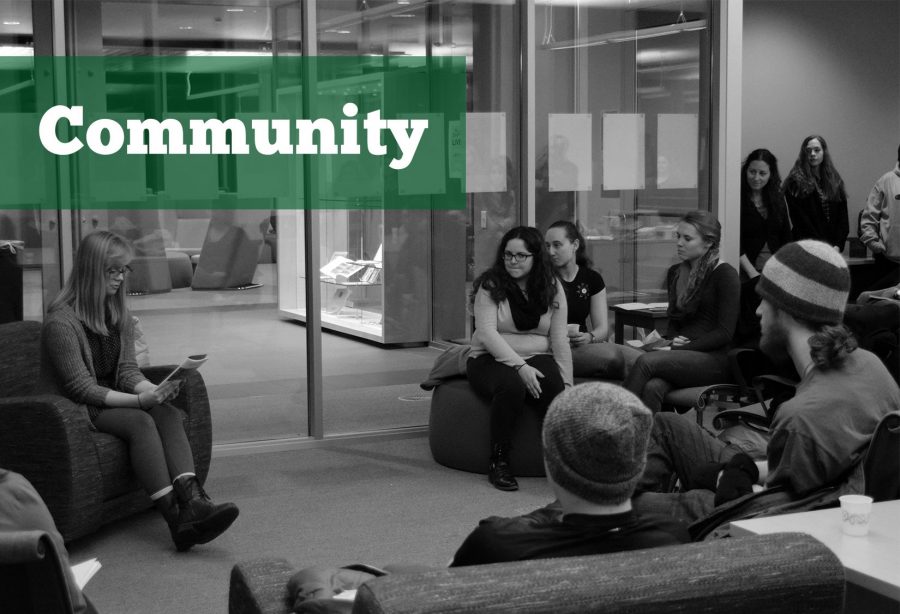Author discusses friendships between men and women from the 18th century
September 22, 2016
Dr. Cassandra A. Good spoke about the themes of her book “Founding Friendships: Friendships Between Men and Women in the Early American Republic” and focused on the intricacies of male-female friendships.
The Social Sciences Department hosted this event on Thursday Sept. 15 at 7 p.m. in the McGowan Community Room of the Swartz Center. Adam Shprintzen, Ph.D., assistant professor of Social Sciences, introduced Good.
Good, the associate editor of “The Papers of James Monroe” at the University of Mary Washington in Virginia, first began research for her book as an undergraduate student. The concept became her doctoral thesis and ultimately evolved into a full-fledged book.
Good was reading a letter that Margot Baron Smith wrote to Thomas Jefferson, and the friendly, affectionate wording led her to believe that she discovered a historical love affair. After considering the dynamic of friendships between men and women of this time period and exploring the subject further, she had enough information for her book.
Good noted the key characteristic of these friendships revolved around the freedom and choice present in mutual friendships, though she was careful not to use the word “platonic.”
“I don’t call [these friendships] platonic,” said Good. “At the time, that meant romantic, but not yet consummated… a lot of friendships could have a physical aspect, but that’s not the defining characteristic.”
Good discussed the benefits of these “strange relationships,” which included emotional support and connection and conversation–not unlike friendships in a contemporary society.
Thomas Jefferson and Abigail Adams had a well-known friendship. According to Good, their relationship is one of a few where both sides of the correspondence is preserved.
“Their letters were playful and witty, but this did not mean they were having a secret affair,” said Good. “You can’t help but like these people when you read their correspondence.”
Though the corresponding parties would be well aware of the nature of their relationship, others could misinterpret an innocent friendship as an illicit affair. According to Good, the people writing had an education, meaning they were likely a member of the middle or elite class. Therefore, they and their relationships were likely in the public eye, especially when it came to letters.
As the postal service did not exist in the 18th century, letters were a public affair: reading the letters aloud to a crowd upon receiving them, carriers reading them, and other parties talking about the letters was normal, meaning the words had to be carefully chosen as to not elicit suspicion.
“Society thought friendships between men and women only had two outcomes: they would fall in love, or the man would seduce the woman, and she would get pregnant and die,” said Good. “ Women were often warned that friendships with men were dangerous and impossible.”
Good noted that men and women within these friendships would call each other by family terms such as “brother” or “sister,” or make sure a third party was involved in the friendship to avoid misinterpretation.
Beyond a personal aspect of the letters was a political aspect. Both men and women would use their friendships with someone of influence to convey their own agenda.
“The involvement of women [in politics] is unofficial during this time,” said Good. “The involvement of women was through friends…There’s also cases where you have men relying on women for political influence,” said Good.
“[Politics] tends to include more than elected officials,” said Good. “That’s a lesson to us about relationships and how they build the fabric of society.”
Attendee Meagan Oliveras, a history/secondary education 2016 alumna, attended the event.
“I enjoy any talks Marywood University has because it gives me a chance to personally convey this information to future students,” said Oliveras.
“It’s interesting to see parts of social history that are not conveyed in courses,” said Oliveras. “It gives a humanizing effect to history… history is not just dates. It can really be a story if you delve into it and study it more.”
Contact the writer: [email protected], [email protected]
Twitter: @ADuncklee_TWW





